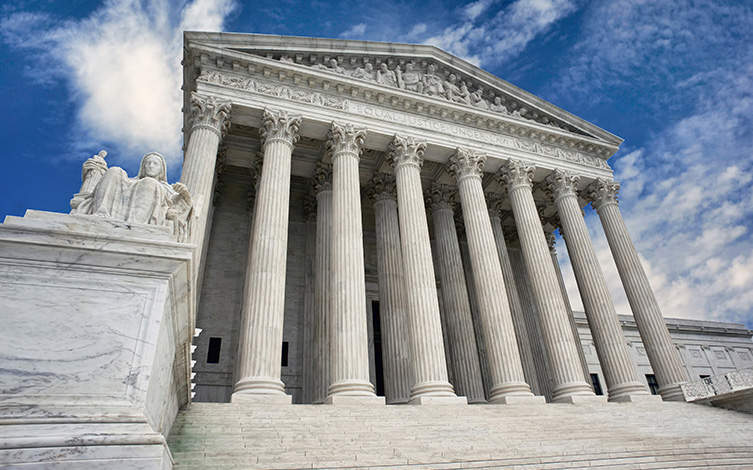On June 15, 2020 the U.S. Supreme Court declined to hear eight (8) cases involving qualified immunity. Two weeks later, on June 29, the Court denied the petition of a ninth case, Cooper v. Flaig, No. 19-1001. Qualified immunity protects government officials (including police officers) “from liability for civil damages insofar as their conduct does not violate clearly established statutory or constitutional rights of which a reasonable person would have known.” Pearson v. Callahan, 555 U.S. 223, 231 (2009). Qualified immunity is not merely a defense, but instead provides complete immunity from suit, which means that it must be resolved as early as possible during litigation. Id. (citing Hunter v. Bryant, 502 U.S. 224, 227 (1991)). This latest round of cases came before the Supreme Court amidst unprecedented tensions between the public and police.
Among the cases pending review were challenges from the Fifth, Sixth, Eighth, Ninth, and Eleventh Circuits. In seven of the eight cases that sought cert. before the Supreme Court, the lower court had dismissed the claims against law enforcement granting qualified immunity. However, in the Fifth Circuit case Hunter v. Cole, No. 19-753, the lower court ruled the officers were not entitled to immunity. In Hunter, the issue was whether an officer is prohibited from firing his weapon to stop an armed individual from moving a deadly weapon toward the officer. By declining these cases, the Court left its qualified immunity undisturbed.
Justice Clarence Thomas dissented from the denial of cert. in the Sixth Circuit case Baxter v. Bracey, No. 18-1287. In that case, the Sixth Circuit granted officers qualified immunity after it found that the plaintiff’s rights were not clearly established. The “clearly established” test protects an officer with immunity unless the plaintiff shows that he or she violated “clearly established statutory or constitutional rights of which a reasonable person would have known.” However, Justice Thomas argued that §1983 qualified immunity doctrine strays from the text of the statute, which does not mention defenses or immunities. He argued that the history of the doctrine developed from a broad application of common law immunity, read to cover good faith and probable cause of police officers sued for unconstitutional arrest and detention. As the doctrine developed further, the subjective analysis of good faith was abandoned to increase efficiency and lower litigation costs. In his dissent Justice Thomas noted that he would grant cert. to reconsider whether the development of the doctrine is consistent with the text and its common law origins.
Similarly, Justice Sonia Sotomayor called for reexamining qualified immunity in her Mullenix v. Luna (2015) dissent. She called out her colleagues for being quick to reverse lower courts that refuse to grant qualified immunity to police officers while refusing to intervene when lower courts wrongly grant immunity. Justice Sotomayor criticized what she viewed as a “one-sided approach” that transforms qualified immunity into “an absolute shield for law enforcement officers.”
The Court has repeatedly rescheduled one qualified immunity case that does not implicate police action. In Davis v. Ermold, No. 19-926, the Sixth Circuit denied immunity to the former Kentucky county clerk after she refused to issue marriage licenses to same-sex couples following the Obergefell decision. The conference was most recently rescheduled on June 25.
The Supreme Court has revisited qualified immunity five times since 2015. Despite a growing number of calls for the Court to revisit the doctrine, three of the five cases were decided per curium, with the Court issuing a unified opinion. Moreover, District of Columbia v. Wesby, 138 S.Ct. 577 (2018) and Mullenix v. Luna, 136 S.Ct. 305 (2015) were decided by a 9-0 vote and 8-1 vote, respectively.
Congress recently attempted to undertake police reform with Democrats and Republicans introducing competing bills in June 2020. Among the points Congress may seek to address via legislation is qualified immunity.
Crabbe, Brown & James’ Managing Partner, Larry H. James, has served as General Counsel to the National Fraternal Order of Police (FOP) since 2001. The National FOP is the world’s largest organization of sworn law enforcement officers with more than 350,000 members in more than 2,100 lodges across the United States.

